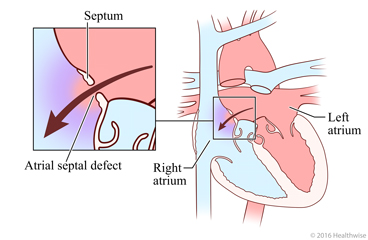
What is an atrial septal defect?
An atrial septal defect is a type of congenital heart disease. Congenital heart disease refers to heart problems a baby is born with.
The heart is a muscular pump with four chambers. The two bottom chambers are the left and right ventricles. The two top chambers—the left atrium and right atrium—are separated by a wall of tissue called a septum. An atrial septal defect is a hole in this wall.
A very small hole may not cause problems. It may close on its own.
When the hole is larger, some of the blood may flow through it from the left atrium to the right atrium. So the right side of the heart may pump too much blood. Over time, this can cause the right ventricle to enlarge. And it can damage the lungs and weaken the heart.
How is atrial septal defect diagnosed?
Your doctor may hear abnormal heart sounds, such as a heart murmur, when examining your baby.
Your doctor will order tests to find the cause of abnormal sounds or of symptoms. The most common test used to identify this problem is called an echocardiogram, or "echo" for short. It uses sound waves to make an image of your baby's heart.
Other tests, such as an EKG (electrocardiogram), chest X-ray, and checking the amount of oxygen in the blood, also help identify the problem.
What are the symptoms?
Many babies have no symptoms, especially if the hole is small. The hole may close on its own over time.
If the hole is large, and the heart has to work too hard, a baby may have symptoms, such as trouble breathing or fast breathing.
How is it treated?
A baby may not need treatment to close the hole if it is small and not likely to cause symptoms or problems. Sometimes a small hole will close over time.
If the hole is larger or starts causing symptoms, your doctor may suggest a procedure or surgery to close the hole.
Your doctor will explain what symptoms to watch for at home. Regular checkups will help your doctor watch your baby for symptoms over time.
What can you expect?
Your doctor will make sure that you have all the information you need to take care of your baby at home.
Many babies won't have any symptoms. They will only need regular checkups. But it is important to watch for symptoms that may mean there is a problem. These include:
- Fast breathing.
- Sweating while feeding.
- Not eating well.
- Not gaining enough weight.
Follow-up care is a key part of your child's treatment and safety. Be sure to make and go to all appointments, and call your doctor if your child is having problems. It's also a good idea to know your child's test results and keep a list of the medicines your child takes.
Where can you learn more?
Go to http://www.healthwise.net/patientEd
Enter Z961 in the search box to learn more about "Learning About Mild Atrial Septal Defect in Newborns".
Current as of: October 2, 2025
Author: Ignite Healthwise, LLC Staff
Clinical Review Board
All Ignite Healthwise, LLC education is reviewed by a team that includes physicians, nurses, advanced practitioners, registered dieticians, and other healthcare professionals.

